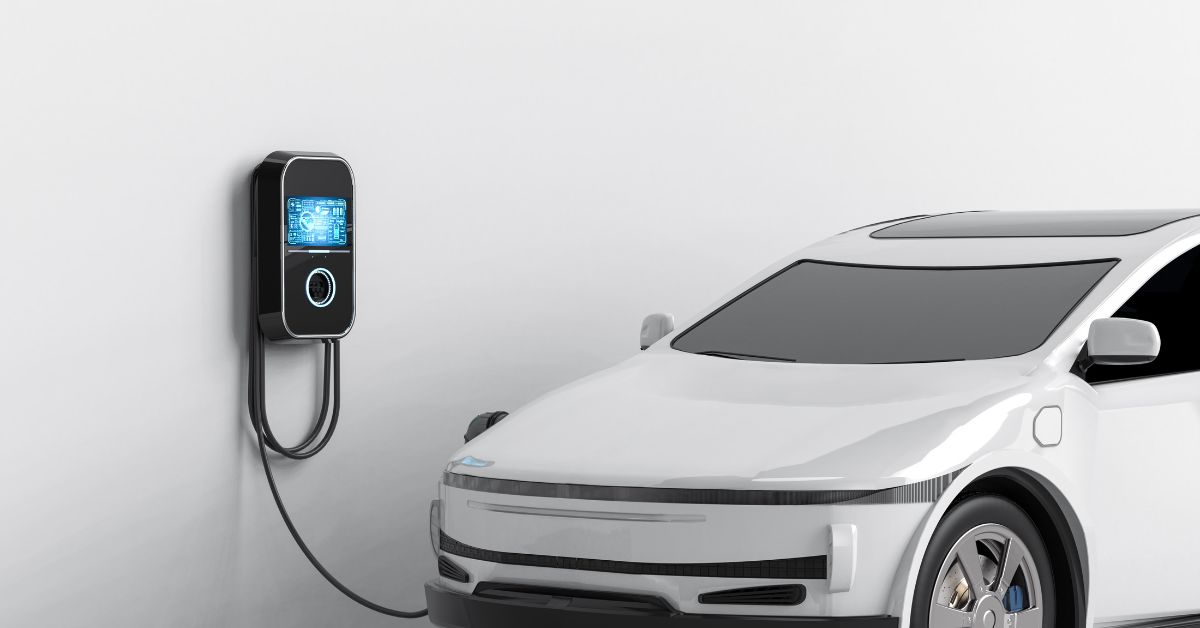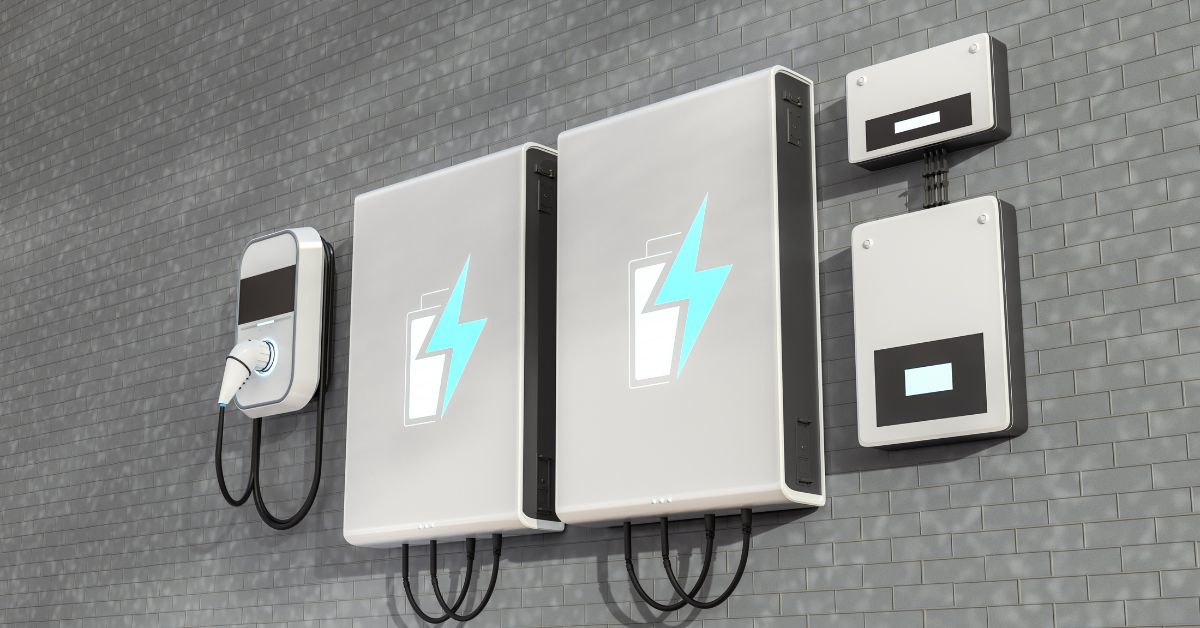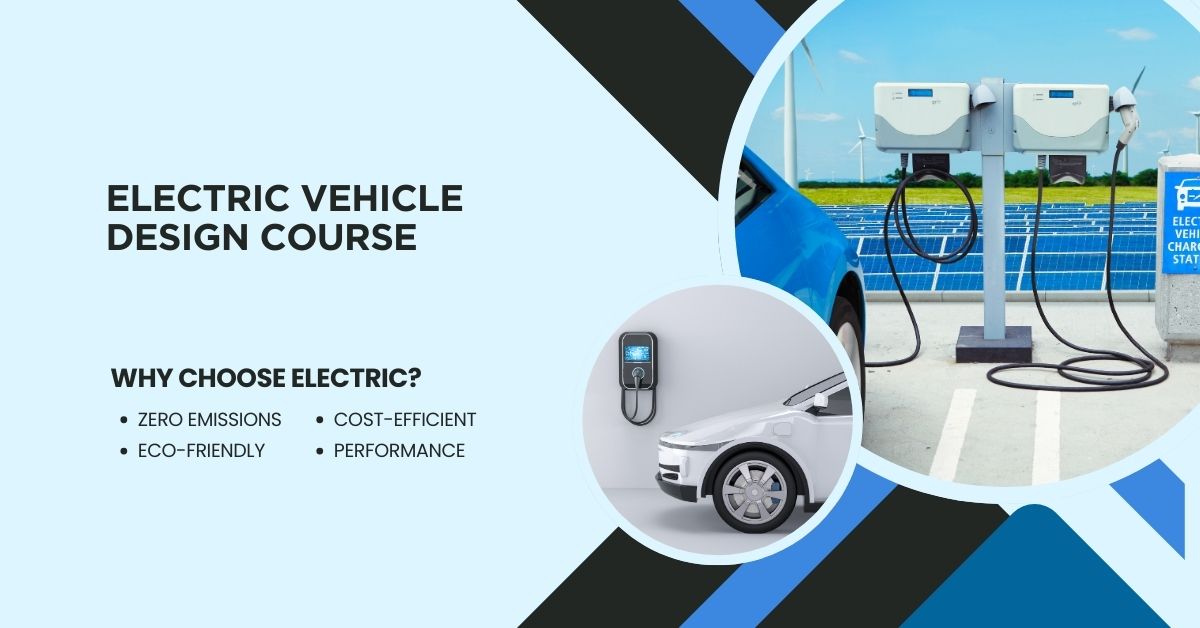Electric Vehicle Design Course
The Electric Vehicle Design Course offers a comprehensive understanding of EV technology, from core principles to advanced design elements. Participants will explore electric powertrains, battery systems, charging infrastructure, and vehicle dynamics.
With hands-on projects and real-world case studies, the course equips students with the skills to design efficient, eco-friendly EVs that meet industry standards. Ideal for engineers, designers, and enthusiasts, this course covers essential software tools, regulatory requirements, and cutting-edge innovations in the EV sector. Graduates will be prepared to contribute to the future of sustainable transportation with practical knowledge and expertise in electric vehicle design.
Table of Contents
Electric Vehicle Design Course: Comprehensive Guide to Understanding EV Design Principles
In recent years, the global automotive industry has been experiencing a dramatic shift towards electric vehicles (EVs). Environmental concerns, regulatory pressures, and the advancements in battery technology drive this transition. As electric cars become more prevalent, there is a growing need for engineers, designers, and technicians to understand the intricacies of EV design. To meet this demand, specialized electric vehicle design courses are being developed to equip learners with the knowledge and skills required to excel in this emerging field.
This blog post will provide an in-depth overview of an electric vehicle design course, exploring the fundamental concepts, core topics covered, essential skills gained, and career opportunities available for students and professionals entering this dynamic sector. Whether you’re a seasoned automotive engineer looking to transition to EVs, or a student eager to get a foothold in the field, this guide will help you understand what an EV design course entails and why it’s crucial for the future of transportation.
The Growing Importance of Electric Vehicle Design
Before diving into the specifics of an electric vehicle design course, it’s important to understand why EV design is a critical area of focus in today’s automotive industry.

- Sustainability and Environmental Benefits: With rising concerns about climate change and pollution, electric vehicles offer a cleaner, more sustainable alternative to traditional internal combustion engine (ICE) vehicles. EVs produce zero tailpipe emissions and, when powered by renewable energy, can dramatically reduce the overall carbon footprint of transportation.
- Government Incentives and Regulations: Many governments worldwide are introducing stricter emission regulations and providing financial incentives for the adoption of electric vehicles. These policies have accelerated the shift toward EVs, making it essential for automotive professionals to adapt to the evolving landscape.
- Technological Advancements: Recent breakthroughs in battery technology, electric motor efficiency, and energy management systems have made electric vehicles more viable, affordable, and efficient. As technology continues to evolve, understanding the design and engineering principles behind EVs becomes even more crucial.
- Market Demand: Consumers are becoming more aware of the environmental and economic benefits of electric vehicles. As demand for EVs increases, so too does the need for professionals who can design and develop innovative, efficient, and cost-effective electric vehicles.
What Is an Electric Vehicle Design Course?
An electric vehicle design course is a specialized educational program that focuses on the engineering, technology, and design aspects of electric vehicles. These courses are typically designed for engineers, students, and professionals who want to acquire the knowledge and skills necessary to work in the electric vehicle industry.
The course covers various areas of EV design, from basic electrical engineering principles to the intricacies of battery management systems, electric powertrains, thermal management, vehicle dynamics, and more. Participants will gain hands-on experience with design tools and simulation software and learn how to address the challenges unique to EV design, such as energy efficiency, range optimization, and safety concerns.
Core Concepts in Electric Vehicle Design
Electric vehicle design involves a variety of technical disciplines, each playing a crucial role in creating an efficient and safe EV. Some of the core concepts covered in an electric vehicle design course include:
Electric Powertrain Design
The powertrain is the heart of any electric vehicle, and its design is fundamental to the overall performance and efficiency of the vehicle.
- Electric Motor: Electric motors convert electrical energy into mechanical energy, providing the necessary torque to drive the wheels. An EV design course will cover different types of electric motors, such as induction motors, permanent magnet motors, and brushless DC motors, and their respective advantages and applications.
- Inverter: The inverter is responsible for converting the DC power stored in the battery into AC power that the electric motor can use. Understanding how to design and optimize inverters for efficiency and reliability is an important part of EV design.
- Transmission: While many electric vehicles operate with a single-speed transmission, understanding the role of the transmission in optimizing motor performance, especially for high-performance EVs, is an important aspect of design.
- Control Systems: Electric vehicles require sophisticated control systems to manage the motor, battery, and other powertrain components. These systems ensure optimal performance, energy efficiency, and safety.
Battery Technology and Energy Storage Systems
Battery technology is at the core of electric vehicle design, as it determines the range, charging time, and overall performance of the EV. In an electric vehicle design course, you will learn about the following:

- Types of Batteries: Lithium-ion batteries are the most commonly used in EVs today, but there are several other types of batteries, such as solid-state batteries and nickel-metal hydride batteries, which have different performance characteristics and applications. Understanding the pros and cons of each type is crucial for designing an EV.
- Battery Management Systems (BMS): The BMS is responsible for monitoring and managing the battery’s health, charging, and discharging processes. A well-designed BMS can extend the life of the battery and improve overall vehicle efficiency. Courses will teach students how to design and implement effective BMS solutions.
- Battery Pack Design: The configuration and packaging of battery cells into a battery pack is a key design challenge, as it affects the vehicle’s weight, size, range, and thermal management. You’ll learn how to design battery packs for optimal performance and safety.
Thermal Management Systems
Electric vehicles generate heat in various components, such as the battery, motor, and power electronics. Thermal management is essential for maintaining the performance, safety, and longevity of these components. An EV design course will cover topics such as:
- Cooling Systems: Designing efficient cooling systems to dissipate heat from the battery, motor, and electronics is critical for preventing overheating and ensuring reliable operation.
- Heat Exchangers and Refrigerants: You’ll learn about the various types of heat exchangers and refrigerants used in electric vehicles, as well as the design principles for integrating them into the vehicle.
- Thermal Modeling: Simulation and modeling of thermal behavior in EVs are key tools for designing effective thermal management systems. Students will gain hands-on experience with simulation software to analyze and optimize thermal performance.
Vehicle Dynamics and Chassis Design
The design of the chassis and vehicle dynamics in an electric vehicle is different from traditional ICE vehicles.
- Weight Distribution: Since the battery is one of the heaviest components in an EV, its placement significantly affects the vehicle’s center of gravity and overall handling. Designers need to consider weight distribution for optimal performance.
- Suspension Systems: Electric vehicles often have different weight distribution and ride characteristics compared to conventional vehicles. Designing the suspension system to accommodate these differences is an important part of the course.
- Aerodynamics: Since EVs rely on maximizing energy efficiency, aerodynamic design plays a crucial role in reducing drag and improving range. Courses will cover the principles of aerodynamics and how to apply them to EV design.
Charging Infrastructure and Energy Efficiency
Understanding how electric vehicles interact with the charging infrastructure is another key component of EV design. Some of the topics covered in this area include:
- Charging Standards: EVs need to be compatible with various charging standards (e.g., CCS, CHAdeMO, Tesla Supercharger), so designers need to understand these standards and how they affect vehicle design.
- On-Board Chargers: These chargers convert AC power from the grid into DC power to charge the battery. Designing efficient and reliable on-board chargers is essential for EV operation.
- Regenerative Braking: This system captures kinetic energy during braking and converts it into electrical energy to recharge the battery. Courses will teach how to design regenerative braking systems to maximize energy recovery and improve efficiency.
Software and Simulation Tools
Electric vehicle design is heavily reliant on advanced software tools for modeling, simulation, and optimization. Some of the key tools used in EV design include:
- MATLAB/Simulink: This popular software is used for modeling and simulating electric powertrains, control systems, and vehicle dynamics.
- ANSYS: ANSYS is used for simulating thermal management, structural integrity, and aerodynamics in electric vehicles.
- Battery Design Software: Tools like Battery Design Studio and AutoLion are used for simulating and optimizing battery performance.
Skills Gained from an Electric Vehicle Design Course
Completing an electric vehicle design course provides participants with a wide range of technical and practical skills that are essential for success in the EV industry. These skills include:
- System-Level Thinking: EV design requires a holistic approach, where all components—from the battery to the motor, chassis, and software—must work together efficiently. Students will develop the ability to think at a system level and make design decisions that optimize overall vehicle performance.
- Hands-On Experience: Many courses offer hands-on labs and projects that give students practical experience with EV components, such as motors, inverters, and battery packs. This practical knowledge is crucial for applying theoretical concepts to real-world applications.
- Problem-Solving and Innovation: The EV industry is constantly evolving, with new challenges and opportunities arising as technology advances. Students will develop strong problem-solving skills and learn how to innovate in areas such as battery technology, energy management, and vehicle design.
- Simulation and Analysis: Understanding how to use simulation tools is a key skill in EV design. Students will gain proficiency in using software to model and simulate vehicle performance, thermal behavior, and energy consumption.
- Interdisciplinary Knowledge: EV design encompasses multiple disciplines, including electrical engineering, mechanical engineering, and computer science. Students will acquire a broad understanding of these disciplines and how they intersect in the design of electric vehicles.
Career Opportunities in Electric Vehicle Design
As the demand for electric vehicles continues to grow, so too does the demand for professionals with expertise in EV design. Completing an electric vehicle design course opens up a wide range of career opportunities in various sectors of the automotive and energy industries. Some of the potential career paths include:

- EV Design Engineer: These engineers are responsible for designing and optimizing the various components of electric vehicles, including the powertrain, battery, and chassis.
- Battery Engineer: Battery engineers specialize in the design and development of energy storage systems for electric vehicles, focusing on improving battery performance, safety, and cost-efficiency.
- Power Electronics Engineer: Power electronics engineers design the inverters, converters, and control systems that manage the flow of electrical energy in EVs.
- Thermal Systems Engineer: These engineers design the cooling and thermal management systems that keep EV components operating within safe temperature ranges.
- Vehicle Integration Engineer: Integration engineers ensure that all the various subsystems of the EV work together seamlessly, from the powertrain to the control systems and software.
- Charging Infrastructure Engineer: As the charging network for electric vehicles continues to expand, engineers are needed to design and implement charging stations and infrastructure that can accommodate the growing number of EVs on the road.
- R&D Engineer: Research and development engineers work on cutting-edge technologies to improve the performance, range, and cost-effectiveness of electric vehicles.
FAQs About Electric Vehicle Design Course
Q1. What topics are typically covered in an EV Design Course?
An EV design course usually covers topics such as electric powertrain design, battery management systems, electric motor selection, vehicle aerodynamics, thermal management, energy storage systems, and control systems.
Q2. Do I need prior automotive or engineering experience to enroll in an EV Design Course?
While prior experience in engineering or automotive fields can be beneficial, many courses are designed for both beginners and professionals. Some basic understanding of physics and electronics may be required.
Q3. What software tools will I learn to use in an EV Design Course?
You’ll likely get hands-on experience with software like MATLAB/Simulink, SolidWorks, CATIA, and other CAD (Computer-Aided Design) tools, as well as simulation software for analyzing vehicle dynamics and thermal management.
Q4. How does an EV Design Course differ from a traditional automotive engineering course?
EV design focuses heavily on electric power systems, energy efficiency, and sustainability, while traditional automotive engineering also includes internal combustion engine design and other mechanical systems.
Q5. Are there any certification options available after completing the EV Design Course?
Many institutions offer certification upon course completion, which can be recognized by employers or used to enhance your credentials in the automotive and electric vehicle industries.
Q6. What kind of projects will I work on during the course?
You may work on practical projects like designing an electric drivetrain, creating a battery management system prototype, or simulating an EV charging station. Some courses may also offer collaborative projects with industry partners.
Q7. Can I specialize in a specific area of EV design, such as battery technology or electric motors?
Yes, many courses offer modules or tracks focusing on specialized areas like battery technology, electric motor design, or vehicle control systems, allowing students to tailor their learning based on interests or career goals.
Q8. How does an EV Design Course prepare me for a career in the electric vehicle industry?
The course provides practical knowledge and skills directly applicable to the EV industry, including design principles, technical expertise, and familiarity with industry-standard tools, preparing you for roles in R&D, manufacturing, or engineering.
Q9. What career opportunities can I explore after completing an EV Design Course?
Graduates can pursue careers as EV design engineers, battery system engineers, electric powertrain specialists, control system engineers, or work in areas such as EV component manufacturing and vehicle testing.
Q10. How long does it take to complete an EV Design Course, and is it available online?
The duration varies depending on the course provider, ranging from a few weeks for short courses to several months for more comprehensive programs. Many institutions offer flexible online options for remote learners.
The rise of electric vehicles is transforming the automotive industry, creating a need for skilled professionals who understand the complexities of EV design. By enrolling in an electric vehicle design course, students and professionals can gain the knowledge, skills, and hands-on experience necessary to excel in this fast-growing field.
Whether you’re interested in designing electric powertrains, developing advanced battery systems, or optimizing vehicle dynamics, an EV design course provides a comprehensive education that prepares you for a successful career in the electric vehicle industry. With the knowledge gained from such a course, you’ll be well-equipped to contribute to the development of the next generation of sustainable transportation technologies.
Click here to learn more about the Electric Vehicle Design Course
Click here to learn more about Electric Vehicle Depreciation Rate Income Tax
